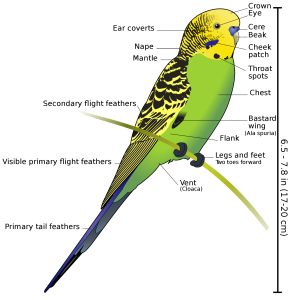[AUTHOR'S NOTE: This was another article originally published as the Atlanta Creationism Examiner, the first in a short series written shortly before the publication of my book Counterargument for God. The purpose of the series was to explain my alternative to Darwin's theory of natural selection as the best potential explanation for the origin of new species, based on the existing evidence. Although my alternate hypothesis involves a supernatural intelligence capable of designing the universe and life within, it is called iterative creation. Other articles in this series include The conjecture of evolution, Compounded improbabilities, and Iterative creation. This morning an atheist acquaintance on the internet inspired publication of this piece (originally written in 2012) by accusing me of advocating intelligent design as a scientific theory. The reality is that my argument is almost the polar opposite extreme -- iterative creation is a philosophical hypothesis that competes with the philosophy known as "macro" evolution to explain the existing scientific evidence, which consists of DNA analysis, the known fossil record, and comparative anatomy.] The "facts" of evolution This might take a while. The argument from authority, which could also be called the argument of superior intellect, gets old after a while. You don’t have to convince me that you’re smart. I'll give you the benefit of the doubt. You only need to convince me that you’re right. Then I'll actually believe what you tell me. A new Facebook friend tried to help me, sending a link to … [Read more...]
The illusion of purpose
Would a watchmaker create a watch that can't tell time? What would be the point? After all, another name for a watch is timepiece. Does a watch have a purpose for existing, if it can't measure time, in some form or fashion? Can something be claimed to have a purpose, if that certain person, place, or thing was created by a blind force that has no true purpose in mind? And why am I (once again) asking myself such ridiculous questions? Naturally, I've been reading the work of Richard Dawkins. (I know, I know -- I'm a glutton for punishment. But what else can I say? The ability of clearly intelligent people to say or write remarkably foolish comments never ceases to amaze me.) While skimming through his book The Blind Watchmaker, I stumbled across this masterpiece of muddled thought, on page 9: A true watchmaker has foresight: he designs his cogs and springs, and plans their interconnections, with a future person in his mind's eye. Natural selection, the blind, unconscious, automatic process which Darwin discovered, and which we now know is the explanation for the existence and apparently purposeful form of all life, has no purpose in mind. It has no mind and no mind's eye. It does not plan for the future. It has no vision, no foresight, no sight at all. If it can be said to play the role of watchmaker in nature, it is the blind watchmaker. Now with that silly little speech fresh in your mind, please watch this brief, fascinating video of a caterpillar allegedly mimicking a snake that a good friend of mine shared on Facebook only this morning. The word … [Read more...]
How did I get here?
The title poses what is known as an existential question -- questions that are much easier asked than answered. Who am I? What happens when we die? Is there a purpose for my life? Existential questions are the sort that you're never completely sure that you've really solved them, until you die. The answers that you decide are most correct will often determine whether or not you believe in God, which may impact many of the life decisions you make. So these are not trivial questions...in fact, they are the most important and difficult questions that we may ever contemplate. How in the hell did I get started writing books that talk about things related to religion and science, when I only received a business degree in college? That's also an excellent question, and an easier riddle to solve because the question itself isn't existential in nature. And this is my answer... I've always loved writing, whether it was source code for computer programs, a short story, or an effort to communicate important thoughts and ideas in concise language through documents I've written. I've always enjoyed tackling difficult problems and then working diligently to solve them. One of my earliest dreams was to become a professional writer one day. However, for the longest time, I was too busy working a full-time job and raising my family to write prose on the side, or to worry much about seeking answers to my existential questions. I had things to do, and people to see. I stayed busy. Then a fateful television interview that was mostly background noise while I worked … [Read more...]
The end of a delusion
My career as a writer was inspired by the word delusion, more than any other word which can be found in the dictionary. Delusions are defined as "fixed false beliefs or opinions" that are resistant to reason even when confronted by actual facts. For this reason, the term is frequently used to describe symptoms of mental illness. The book The God Delusion by renowned atheist and biologist Richard Dawkins was the inspiration for my first published book, Divine Evolution, after I heard Dawkins say in an interview that cars, computers, and even his book were all intelligently designed, but human beings were not. I still haven't gotten over the absurdity of his comment -- I began learning about computers while matriculating as a student at UGA, which was followed a long career as a software developer before becoming a professional writer. So I am well aware that the capabilities of an "intelligent designed" computer actually pales in comparison to the human brain, that DNA is exponentially more complex than computer machine language, and that the "software" that operates the human body works independently of our conscious brain is infinitely more complex than the source code for Google's search engine. Richard Dawkins made it crystal clear in his book that he believes supernatural phenomena does not exist. According to him, only the "real" or material world exists -- no gods, devils, ghosts, angels, or demons. No miracles, no answered prayers. Of course, I couldn't write Divine Evolution until I'd done quite a bit of research into the science of evolution … [Read more...]



